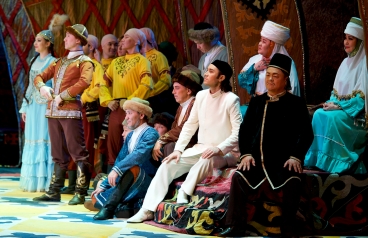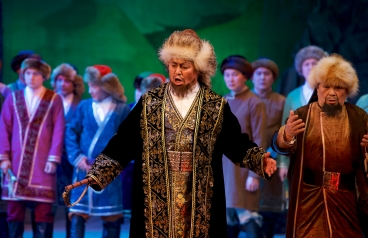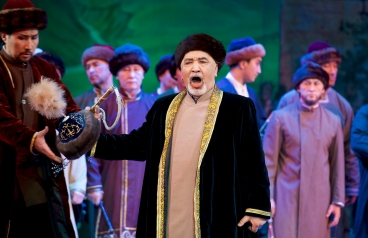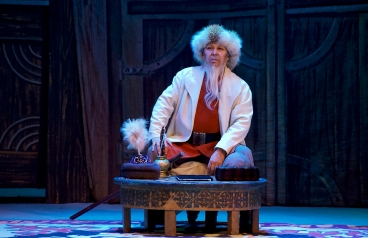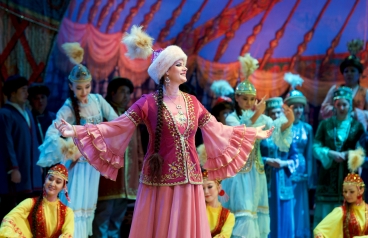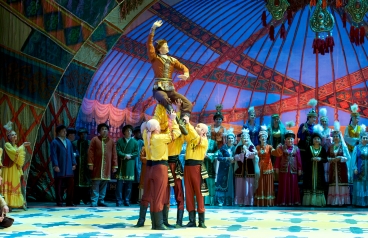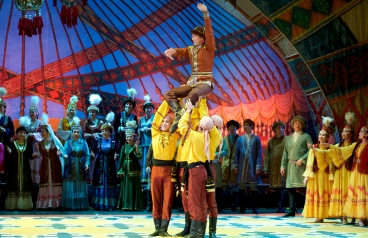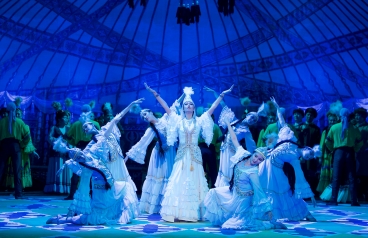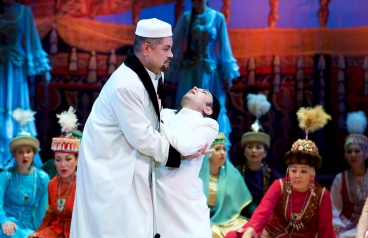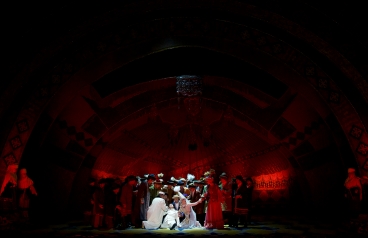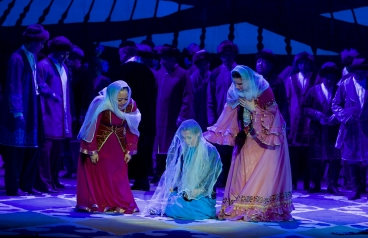ABAY (historical production)
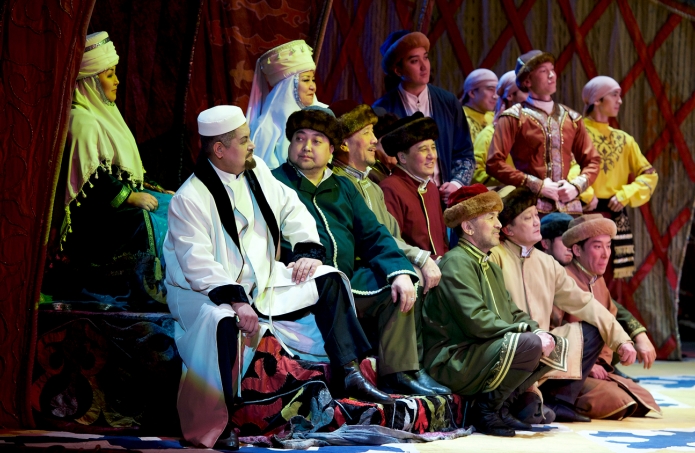
Akhmet Zhubanov, Latif Khamidi
"ABAY"
Libretto by Mukhtar Auezov
Opera in 3 acts
The performance has two intermissions.
Duration: 2 hours 40 minutes
Age category: 10+
Opera performed in Kazakh with synchronized Russian and English subtitles
Characters:
Abay, akyn, educator (baritone)
Azhar, Aidar's love (soprano)
Aidar, akyn, student of Abay (tenor)
Zhirenshe, bi (baritone)
Azim, a relative and student of Abay (tenor)
Karlygash, a relative of Abay (mezzo-soprano)
Kokbai, poet, young friend of Abay (baritone)
Syrttan, bi, aksakal-venerable elder (bass)
Narymbet, a relative of Zhirenshe (tenor)
Mes, dzhigit from Narymbet's suite (tenor)
Horsemen, old people, women, people
Symphony Orchestra, Chorus and Ballet of the Abay Kazakh National Opera and Ballet Theatre
Staged by the People's Artists of the Kazakh SSR, laureates of the Stalin Prize, second degree: Kurmanbek Dzhandarbekov and Baigali Dosymzhanov
Production Team:
Director of the renewed production - Laylim Imangazina, Honored Figure of the Republic of Kazakhstan
Costume and Scenic Designer - Kulakhmet Khodzhikov, Honored Art Figure of the Kazakh SSR
Chorus Master - Aliya Temirbekova
Choreographers - directors - Dauren Abirov, People's Artist of the Kazakh SSR, Mintai Tleubayev, Honored Art Figure of the Kazakh SSR
History
The premiere of the performance took place in the winter of 1944
The opera «Abay» - one of the best achievements of the opera art of Kazakhstan, the greatest musical and stage work of the three founders of Kazakh modern culture - composers A. Zhubanov, L. Khamidi, writer M. Auezov, still seems to be a certain result of the ascent to the heights of opera excellence in classical world understanding.
The libretto to the opera based on novel «The Way of Abaу» was written by Mukhtar Auezov. The hero of the novel is the famous Kazakh enlightener, philosopher, poet, writer, public figure, the founder of modern Kazakh written literature, the reformer of culture in the spirit of rapprochement with Russian and European culture - Abay Kunanbaev (1845-1904).
The music was authored by an outstanding musicologist, conductor, one of the founders of music education in Kazakhstan, Akhmet Zhubanov and composer, author of many songs of romances and waltzes Latif Hamidi.
The starting point in the creation of the opera was the music of Akhmet Zhubanov for the dramatic performance of the same name by Mukhtar Auezov. Back in 1940, Akhmet Kuanovich asked the author of the play to write a libretto for the opera, taking as its basis the same plot as in the expanded dramatic play, but making the text more concentrated and short.
The opera «Abay» is the story of the romantic and tragic love of two young people - Aidar and Azhar, the eternal struggle of conservatism and reformism, in the prism of which the light and dark sides of people are refracted. Against obsolete laws in the opera, Abaу and his disciple Aydar advocate. The opera «Abay» became the musical stage embodiment of the idea of the triumph of love and freedom. The image of Abaу, like the oracle heroes of Greek tragedy, is perceived as the ethical conscience of the people. Between truth and falsehood, justice and treachery, kindness and envy, fidelity and betrayal, feeling and duty, all heroes make a choice. The image of Abay is consistently becoming more and more voluminous and is already perceived as the ideal of a person towards the finale, despite life contradictions and tragedies striving to be free at least in the choice of personal life, in love and self-expression.
The wonderful music of the two composers, nevertheless due to lack of professionalism and simply auditory experience in opera culture, did not allow the authors to completely solve the dramatic tasks and give the music an effective character. The orchestral palette was not fully used by them in the symphonization of musical material. However, all this does not prevent the listeners from completely immersing themselves in the different emotions and feelings of the characters - love, anxiety, joy, the bitterness of loss and the motives of hope. In the music of the opera, composers used the well-known songs of Abay: «Kоzimnіn Karasу» («You are the pupil of my eyes»), «Karagy tүnde tau қalyғyp» («Mountain Peaks»), «Қai Talgy» («Conversation»), «Ayttym Salem Kalamkas» («I send greetings to you, thin-browed ...»), «Uzyn kaiyn» («Birch»). The melodiousness of the musical solution, the close connection with the folk song heritage ensured the work's success.
Subsequently, the musical material of the opera was edited by the daughter of one of the authors of the opera. The composer Gaziza Zhubanova saw the possibilities of the further stage life of the opera not only in the stage solution of the play, but also in the musical material itself, therefore, it made some changes in the author's score as part of the orchestration.
The opera «Abay» was the first experience of Kazakh composers, and in Kazakh music it was only the tenth, while the West European opera culture has a three-century history.
The premiere of the opera «Abaу» took place on December 24, 1944 on the stage of the Kazakh Academic Opera and Ballet Theater, on the eve of the 100th anniversary of the great enlightener Abaу.
The opera «Abay», created by the creative union of composers Akhmed Zhubanov and Latif Hamidi on the libretto of Mukhtar Auezov, annually opens the theater season of the Abay KSATOB. The opera premiered on December 24, 1944 on the stage of the Kazakh Academic Opera and Ballet Theater on the eve of the 100th anniversary of the great poet. The huge success of the opera in the homeland continued with a triumphal march through the cultural capitals of the world.
The first director of the performance was Kurmanbek Zhandarbekov, the artist-decorator was Kulakhmet Khodzhikov, and the conductor was Leonid Shargorodsky. The first leading actor was the outstanding opera baritone People's Artist of the USSR Rishat Abdullin (1916-1988). He will have many more vivid images in his career, including Onegin in the opera Eugene Onegin, Targin in Yer-Targyn and Kozhagul in Birzhan and Sarah, however he will play Abai's part for the longest time, until the mid-80s. years. Later, the image of the main character of the opera was embodied by Ermek Serkebaev and Gafiz Yesimov. Kulyash Bayseitova, Shabal Beisekova and Roza Zhamanova were inimitable in the party Azhar. Anuarbek Umbetbaev, Baygali Dosymzhanov, Nariman Karazhigitov and Alibek Dnishev more than once embodied the image of Aidar in love.


